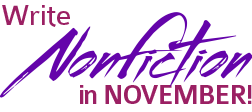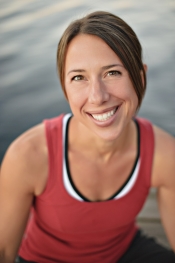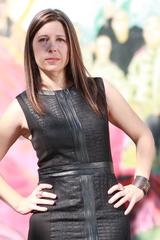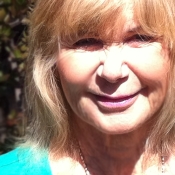For Immediate Release:
Dateline: Los Gatos,
CA
Wednesday, November 16, 2016
 This post is part of the Write Nonfiction in November Challenge (WNFIN), also known as National Nonfiction Writing Month (NaNonFiWriMo), which is brought to you by the Nonfiction Writers’ University — join today for just $1! To find out more or participate in the WNFIN challenge, click here.  There’s nothing to writing a nonfiction book, right? After all, it’s just you telling your personal story or sharing your knowledge. It’s not like writing fiction, where you have to create an entire tale from scratch. What can be so difficult? In fact, there’s more to writing a nonfiction book than you might imagine. And there’s more to crafting a successful nonfiction book than just developing a good idea. And, of course, you have to write the book—produce a manuscript. That’s not too hard, right? Wrong. Many wannabe writers just talk about writing but never write. You don’t want to be that person, especially if you plan to participate in the WNFIN Challenge. You want to write effectively for 30 days and produce a finished manuscript. To help you craft a great nonfiction book more easily and effectively, I asked four nonfiction writing experts to answer this question: What are your best tips on how to write a nonfiction a book?Their answers follow. And, since I am a book coach, author coach and nonfiction developmental editor, here are my three tips: - Create a business plan for your book before you write a word. In The Author Training Manual I explain that every book requires a business plan. This ensures that you craft the most marketable book possible. That means you write a book your readers want and need and that is unique and necessary in the category where it will be sold in the bookstore.
- Block out time to write. It’s easy to get lost in the demands of your day. That’s why you must have a block of creative time or time to write without distraction daily. Try writing in the morning or late at night when the house or office is quiet.
- Plan out your book in detail. Your business plan, which is similar to a book proposal, requires that you develop a book structure (table of contents) and chapter summaries. That means you have to determine what will go in each chapter long before you begin on your manuscript. This can feel tedious and difficult, but when you complete the summaries, you will “see” your book. You’ll know exactly what to write, and this will help you write quickly and effectively. You’ll never stare at a blank page.
Debbie Reber- Write a mission statement for your book. Writing a book can be a long process. It’s messy. And it takes serious endurance. It’s easy to get lost, especially the further into the journey you go. A solid mission statement that truly captures the essence of your vision for the book will be invaluable as you move forward. First, answer the following questions honestly and thoughtfully: Why are you compelled to write your book? What do you want people to get out of it? What do you hope it will do in the world? What is your highest intention for your book? Once you’ve answered these, use your answers to craft a powerful mission statement.
- Get feedback on your nonfiction book idea before you begin writing. Talk to potential readers through informal “focus groups,” an online survey, or even one-on-one coffee dates where you can converse about your vision. I’ve yet to have a pre-writing conversation with my future audience that hasn’t resulted in at least a few invaluable aha moments. To be clear, I’m not suggesting book development by committee. But as writers, we spend a lot of time in our own heads. And we don’t know what we don’t know. Taking the time to talk to your readers will ensure you’re writing the book that people need and want.
- Find 1-2 trusted “beta readers” to read your completed draft. Identify a few people who will compassionately give you honest feedback on your manuscript. Then be open to receiving / hearing what these beta readers have to say. It might feel scary to share your writing with others, but remember that you are still in charge. Thoughtfully consider your readers’ comments, but only implement those changes that feel spot on and ditch the rest. And only choose beta readers who are a positive and encouraging force in your life. Naysayers or pessimists need not apply!
 Debbie Reber Debbie Reber is a New York Times’ bestselling author, writing coach, speaker, and most recently, founder of TiLT Parenting and host of the TiLT Parenting Podcast. As a writing coach, she specializes in working with writers who hope to traditionally publish their nonfiction book. Debbie’s most recent books including Doable: The Girls’ Guide to Accomplishing Just About Anything, Chill: Stress-Reducing Techniques for a More Balanced, Peaceful You and In Their Shoes: Extraordinary Women Describe Their Amazing Careers. Originally from the U.S., Debbie and her family moved to Amsterdam, the Netherlands, in 2013. Website: http://www.debbiereberwritingcoach.comTwitter: @debbiereberElizabeth LyonsOver the past 13+ years, I’ve learned a variety of lessons as an author and publisher but none more important than these:
- Make sure that you are clear on your WHY. Too often, authors write without a clear understanding of WHY they are writing. In order to avoid unnecessary frustration and disappointment once the book is released, it is critical to be honest with yourself about your goals in writing the book, who your prospective reader is and what he or she will value about your book, specifically, and what “success” looks like to you.
- Marketing efforts are going to fall into your lap no matter the publishing paradigm you choose. Whether you self-publish or publish through a vanity or traditional publishing house, the bulk of your book marketing strategy, efforts and cost fall on you. There is often a misconception that the big publishing houses organize (and fund) book tours, signings and marketing campaigns for new authors, and the reality can leave authors frustrated and fearing that their book will fail. Knowing exactly what to expect and doing the due diligence up-front to plan a marketing strategy makes the journey much more enjoyable!
- Be the tortoise. Writing and publishing a book is a marathon, not a sprint. As with literal marathons, the distance from start to finish can seem extremely long, especially when one is merely at the start line. Remember, every step gets you closer to your goal. Some days you’ll take one step, some days you’ll take 1,000 (and some days you’ll take zero). Keep in mind that carefully considered steps in the right direction are far more valuable than steps taken simply for the sake of being taken. Therefore, do your research, create a writing/publishing plan and be disciplined enough to stick with that plan (while being flexible enough to slightly alter course if and when necessary).
 Elizabeth Lyons Elizabeth Lyons is the bestselling author of three books, an editor with 20+ years of experience, and a book writing/publishing coach. She wholeheartedly believes that each of us has a unique story to tell or a message to share—and that there are thousands of readers just waiting to hear it. You can learn more about her at www.publishaprofitablebook.com and Facebook.com/PublishAProfitableBook. Website: http://elizabethlyons.com/Twitter: @elizabethlyonsJudy Cullins- Write down a pre-marketing checklist to know before you write much. Include know and find your ideal audience, create a strong book title your audience can Google to find your gem, and write five to seven benefits of your book. These give you direction to writing clear, engaging copy and help you finish much faster.
- Write down your audience-driven chapter outline. It should present one particular problem for each chapter. I suggest starting with a shorter eBook of five to seven chapters, from 35 to 100 pages in length. You can give it away to entice others sign up for your site’s free articles and, in that way, to build your fan base. You also can use it to attract your growing audience to your repurposed products and services you offer.
- Give solutions to your audience’s challenges in the middle part of each chapter. Use my “Fast-Writing Chapter Blueprint” so you only have to edit one or two times.
- Finish faster and stay motivated. Set special time blocks to write each day or two. I suggest you name each “High-Level Activity” in your organizer because specifics such as “Client Case #1-Mary Contrary’s Challenge” get manifested; general ideas, such as “write Chapter 2,” don’t get done.
- Bring your positive mindset to the workstation every day you write. Practice gratitude, affirm you can do this, and let go of thoughts such as “I can’t.” Or “I’m stuck.” Remember, your thoughts create your reality. You may as well set the scene as your domain.
 The Original Book Coach Judy Cullins, author of 20 personal growth and 18 Book and Business books including Write your eBook or Other Short Book-Fast!, solves the tough problems for top business people writing a book their audience will love. She determines their unmet needs of having enough time, positive mind set and tried and true writing skills that create a book their ideal audience will love. Don’t miss her up-to-date tips on content writing at www.bookcoaching.com/subscribeWebsite: http://bookcoaching.com/Twitter: @CoachJudyDinty Moore- What is crucial, whether you are writing memoir or a more journalistic project, is to begin with questions, and an open mind. The questions have to be difficult to answer, not simple or obvious. Your pursuit of the elusive answers is what will give the book its energy—the energy you need to get all the way through the long process, and the energy that keeps readers turning the pages.
- Beyond that, remember that writing a nonfiction book is not simply a matter of telling your readers “what happened.” Instead, you are exploring and interrogating what happened. The book is what you make of the experience, what you find fascinating thirty years or three months later.
 Dinty W. Moore Dinty W. Moore is author of Dear Mister Essay Writer Guy: Advice and Confessions on Writing, Love, and Cannibals, the memoir Between Panic & Desire, winner of the Grub Street Nonfiction Book Prize, and many other books. Moore has published essays and stories in The Southern Review, The Georgia Review, Harpers, The New York Times Sunday Magazine, Arts & Letters, and The Normal School among numerous other venues. He edits Brevity, an online journal of flash nonfiction. Website: http://www.dintywmoore.comTwitter: @brevitymagTake the Challenge!To learn more about how to take the WNFIN Challenge and participate in NaNonFiWriMo, click here. Are you ready to take the challenge? If so, click here. The post 16 Tips to Help You Write a Nonfiction Book appeared first on Write Nonfiction NOW!.
Nina Amir, the bestselling author of How to Blog a Book and The Author Training Manual, is a speaker, a blogger, and an author, book, blog-to-book, and high-performance coach. Known as the Inspiration to Creation Coach, she helps creative people combine their passion and purpose so they move from idea to inspired action and positively and meaningfully impact the world as writers, bloggers, authorpreneurs, and blogpreneurs. Some of Nina’s clients have sold 300,000+ copies of their books, landed deals with major publishing houses and created thriving businesses around their books. She is the founder of National Nonfiction Writing Month, National Book Blogging Month, and the Nonfiction Writers’ University. As a hybrid author she has published 19 books and had as many as four books on the Amazon Top 100 list at the same time. Her most recent book is called Creative Visualization for Writers, and tomorrow her 19th book will be released, The Write Nonfiction NOW! Guide to Creativity and Flow. Find all her books at booksbyninaamir.com or find out more about her at ninaamir.com.
|